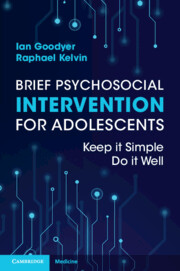Book contents
- Brief Psychosocial Intervention for Adolescents
- Brief Psychosocial Intervention for Adolescents
- Copyright page
- Contents
- Acknowledgements
- 1 Adolescence and the Psychotherapies
- 2 Evidence-Based Psychotherapy
- 3 Evolving the BPI Method
- 4 The Evidence Base for BPI
- 5 Practice Framework and Clinical Principles
- 6 Clinical Styles and Therapy Tools
- 7 BPI in Clinical Practice: Part One
- 8 BPI in Clinical Practice: Part Two
- 9 Top Tips for Best Practice
- Index
- References
4 - The Evidence Base for BPI
Published online by Cambridge University Press: 16 March 2023
- Brief Psychosocial Intervention for Adolescents
- Brief Psychosocial Intervention for Adolescents
- Copyright page
- Contents
- Acknowledgements
- 1 Adolescence and the Psychotherapies
- 2 Evidence-Based Psychotherapy
- 3 Evolving the BPI Method
- 4 The Evidence Base for BPI
- 5 Practice Framework and Clinical Principles
- 6 Clinical Styles and Therapy Tools
- 7 BPI in Clinical Practice: Part One
- 8 BPI in Clinical Practice: Part Two
- 9 Top Tips for Best Practice
- Index
- References
Summary
Brief psychosocial intervention was first used as a non-manualised reference treatment for depressed adolescents receiving the antidepressant fluoxetine with or without CBT. Both the treatment groups received the forerunner of BPI, specialist clinical care, as their general clinical support. The surprise was that CBT provided no added value over fluoxetine and specialist clinical care by the end of the study, which was only a short-term outcome of some 28 weeks [1]. This was the first finding that specialist clinical care provided by psychiatrists and mental health nurses to depressed adolescents may be as clinically effective as specialised psychological treatments such as CBT.
An interesting consequence of this study was to ask: what exactly did the therapists do when delivering specialist clinical care and how was it delivered?
- Type
- Chapter
- Information
- Brief Psychosocial Intervention for AdolescentsKeep it Simple; Do it Well, pp. 33 - 46Publisher: Cambridge University PressPrint publication year: 2023



